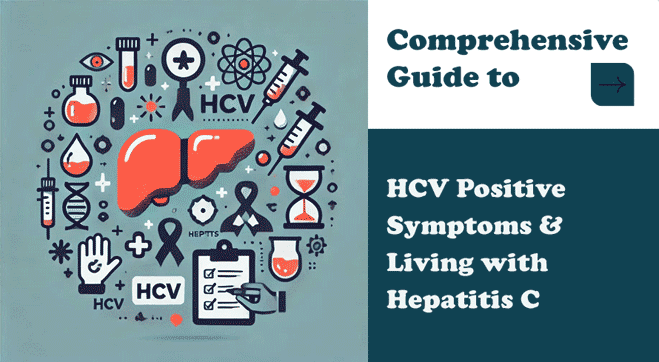Hepatitis C (HCV) is a viral infection that primarily affects the liver, leading to inflammation and potentially serious liver damage. It is caused by the hepatitis C virus, which is transmitted through blood-to-blood contact. This can occur through sharing needles, unscreened blood transfusions, or, less commonly, through sexual contact or from mother to child during childbirth.
Understanding HCV is crucial as it can range from a mild illness lasting a few weeks to a serious, lifelong illness. Many people with HCV may not even know they are infected because they do not feel sick or show any symptoms.
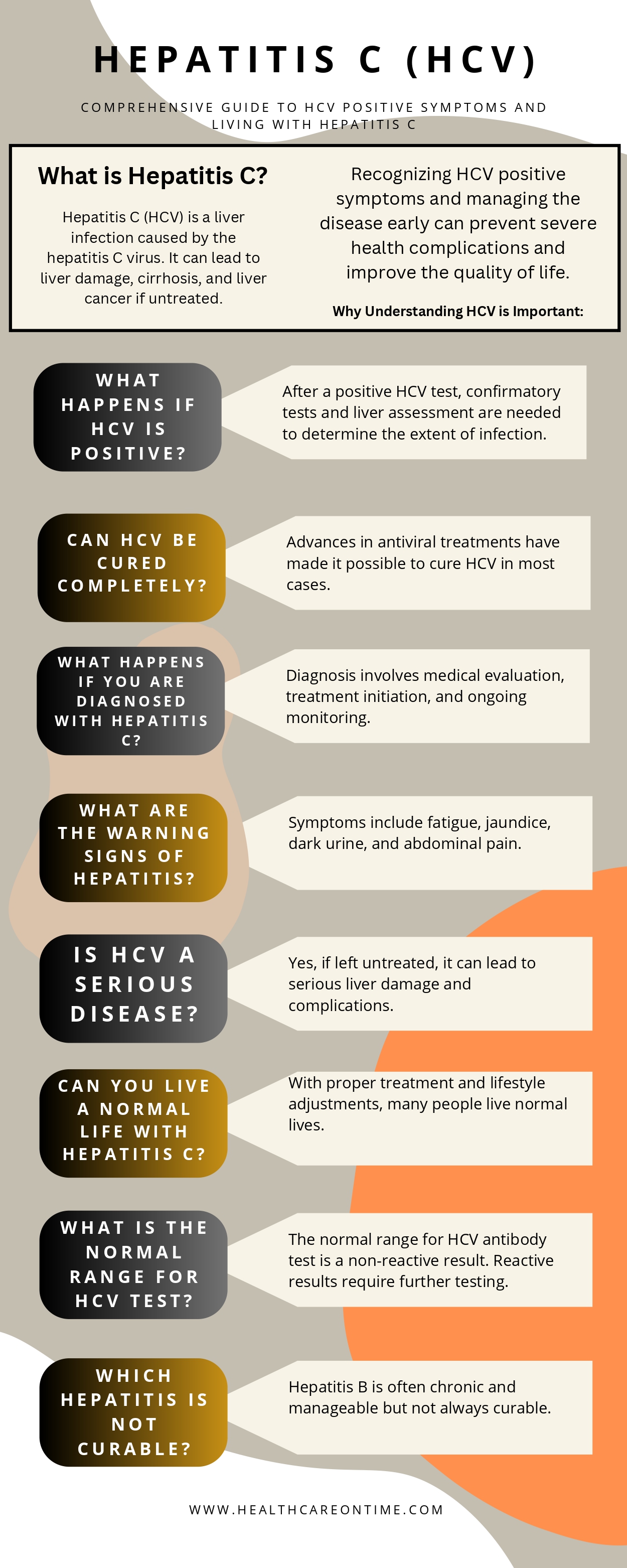
Importance of Understanding HCV Positive Symptoms and Disease Management
Recognizing the symptoms of HCV is essential for early detection and effective management of the disease. Early symptoms can often be subtle and easily mistaken for other health issues. Common symptoms include fatigue, fever, joint pain, and jaundice (yellowing of the skin and eyes).
Identifying these symptoms early can lead to timely testing and diagnosis, allowing for better health outcomes. Effective disease management can prevent the progression of liver damage and improve the quality of life for those infected.
Understanding what happens if HCV is positive is crucial for patients and healthcare providers. It involves a series of steps including confirmatory tests, assessing the extent of liver damage, and formulating a treatment plan.
These steps are vital to ensure that the patient receives the necessary care and can take measures to manage the infection and its symptoms.
HCV Positive Symptoms
Detailed Explanation of Symptoms
HCV positive symptoms can vary widely from person to person. Many individuals with Hepatitis C (HCV) might not experience symptoms immediately. When symptoms do occur, they can often be mild and mistaken for other illnesses. The most common HCV positive symptoms include fatigue, which can range from mild to severe and can significantly impact daily life.
Other symptoms are jaundice, where the skin and eyes turn yellow due to the buildup of bilirubin, a byproduct of the breakdown of red blood cells. Some people might experience dark urine, pale stools, and abdominal pain or discomfort, often located in the upper right quadrant where the liver is situated. Additionally, symptoms such as nausea, loss of appetite, and joint pain are also commonly reported.
Frequency and Severity of Symptoms
The frequency and severity of HCV positive symptoms can differ based on the stage of the infection. In the acute phase, symptoms may appear within six months of exposure to the virus, though not everyone will experience symptoms during this period. Acute symptoms, if they occur, are typically short-lived but can be quite intense. In the chronic phase, which develops if the infection persists for more than six months, symptoms can become more persistent and severe.
Chronic HCV can lead to more serious conditions such as cirrhosis (scarring of the liver), liver failure, or liver cancer. This is why recognizing HCV positive symptoms and seeking timely medical advice is crucial.
When to Seek Medical Advice
It is essential to seek medical advice if you experience any HCV positive symptoms, especially if you have risk factors for Hepatitis C, such as a history of intravenous drug use, received blood transfusions before 1992, or have been exposed to contaminated needles. Early detection and diagnosis can significantly improve treatment outcomes. Medical advice should be sought immediately if you notice jaundice, persistent fatigue, dark urine, or unexplained abdominal pain, as these can be warning signs of hepatitis.
If you suspect you have been exposed to HCV, consulting with a healthcare professional for appropriate testing and potential treatment options is important. Understanding what are the warning signs of hepatitis can help in recognizing the need for medical intervention.
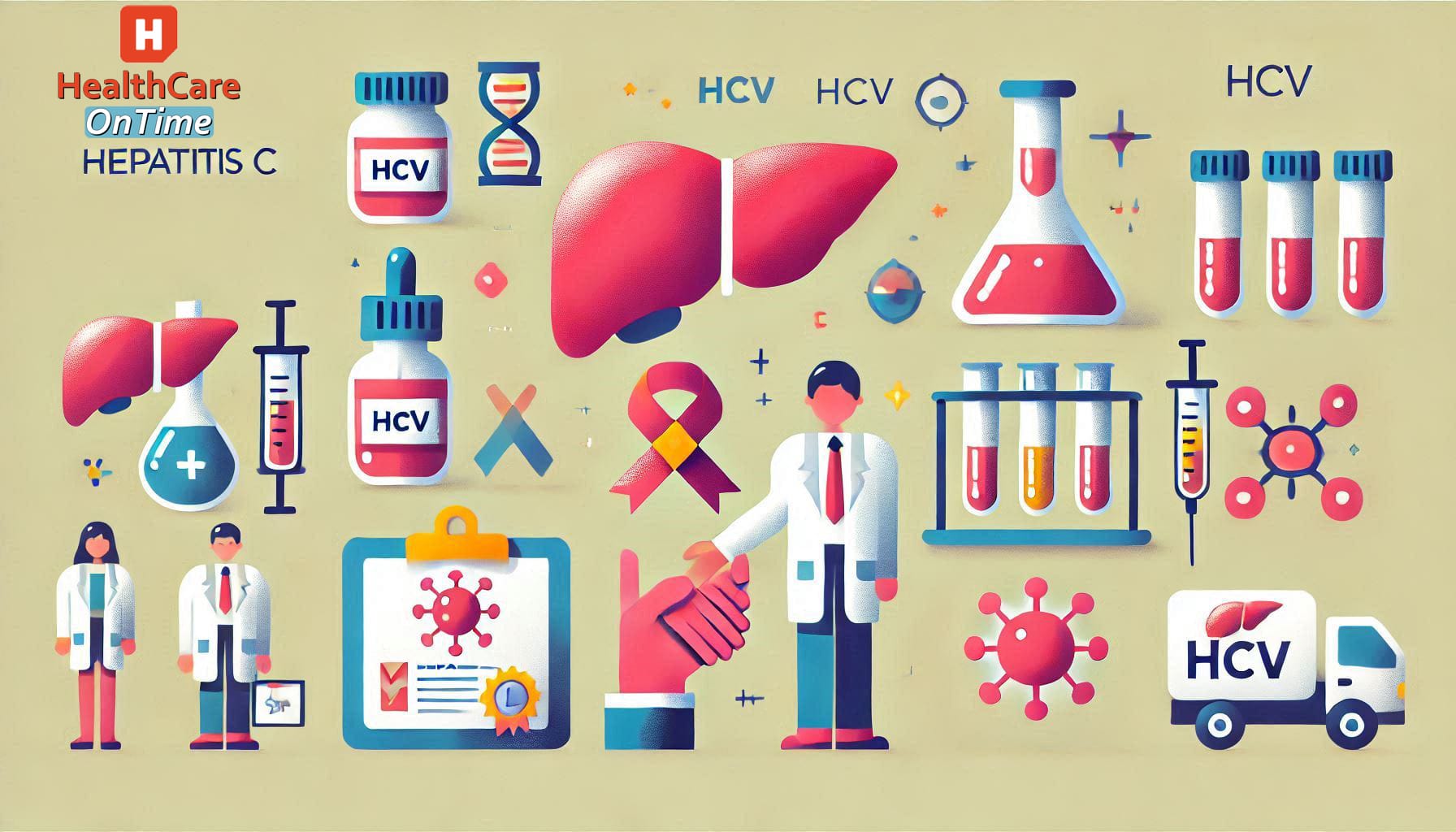
What Happens if HCV is Positive?
Steps Following a Positive HCV Test
Receiving a positive result for a Hepatitis C (HCV) test can be overwhelming. The first step is to understand what happens if HCV is positive. Initially, your healthcare provider will discuss the results with you and explain the implications. A positive test indicates that you have been exposed to the HCV virus and that the virus is present in your bloodstream. It’s important to stay calm and know that there are effective steps to manage and treat the infection.
Confirmatory Tests and Liver Assessment
After an initial positive HCV test, your healthcare provider will recommend confirmatory tests to ensure the accuracy of the diagnosis. These tests typically include the HCV RNA test, which detects the presence of the virus’s genetic material in the blood. If the HCV RNA test confirms the infection, the next step is to assess the condition of your liver. This is crucial because HCV primarily affects the liver, and understanding its impact is essential for planning treatment. Tests such as liver function tests, imaging studies like ultrasound or MRI, and sometimes a liver biopsy might be performed to evaluate liver damage or fibrosis.
Initial Treatment Planning
Once the diagnosis is confirmed and the liver assessment is complete, the next step is to develop an initial treatment plan. Your healthcare provider will discuss various treatment options based on the extent of liver damage and the genotype of the HCV virus. Understanding what happens if HCV is positive is vital in this stage as it involves making informed decisions about your health.
Modern treatments for HCV are highly effective, with many patients achieving a cure, which means the virus is no longer detectable in their blood after completing the treatment course.
The treatment plan may include antiviral medications that target the HCV virus directly, helping to eliminate it from your body. The duration and type of treatment can vary but typically involve taking medication for several weeks to a few months.
It is essential to adhere to the treatment regimen and attend regular follow-up appointments to monitor progress and manage any side effects.
Can HCV Be Cured Completely?
Advances in Treatment
Over the past few decades, there have been significant advances in the treatment of Hepatitis C (HCV), leading to a high success rate in curing the infection. Historically, treatment options were limited and often associated with severe side effects. However, the introduction of direct-acting antivirals (DAAs) has revolutionized the management of HCV.
These medications target specific steps in the HCV life cycle, effectively halting the virus’s ability to replicate. The question “Can HCV be cured completely?” can now be answered with a resounding “Yes” for many patients, thanks to these medical breakthroughs.
Success Rates of Current Therapies
The success rates of current HCV therapies are impressive, with cure rates exceeding 95% for many patients. The effectiveness of these treatments can be attributed to the ability of DAAs to clear the virus from the bloodstream, often within 8 to 12 weeks of starting therapy.
When asking “Can HCV be cured completely?” it’s important to understand that achieving a cure means the virus is no longer detectable in the blood three months after completing treatment. This outcome is referred to as a sustained virologic response (SVR), and it is considered a permanent cure. It’s also worth noting that the success of these therapies is consistent across different HCV genotypes and patient populations.
Importance of Early Detection and Treatment
Early detection and treatment of HCV are critical in ensuring the highest chances of a complete cure. When asked, “What happens if HCV is positive?” the next step involves confirmatory testing and early intervention. Early treatment helps prevent the progression of liver disease, reduces the risk of complications such as cirrhosis and liver cancer, and improves overall health outcomes.
“What happens if you are diagnosed with Hepatitis C?” Early diagnosis allows for timely treatment, which is crucial given that HCV can be a serious disease if left untreated.
The importance of early detection cannot be overstated. Many individuals with HCV may remain asymptomatic for years, unknowingly contributing to the spread of the virus and facing potential long-term health issues. Regular screening for high-risk individuals and prompt medical evaluation upon detection of HCV positive symptoms are vital steps in managing the disease and achieving a cure.
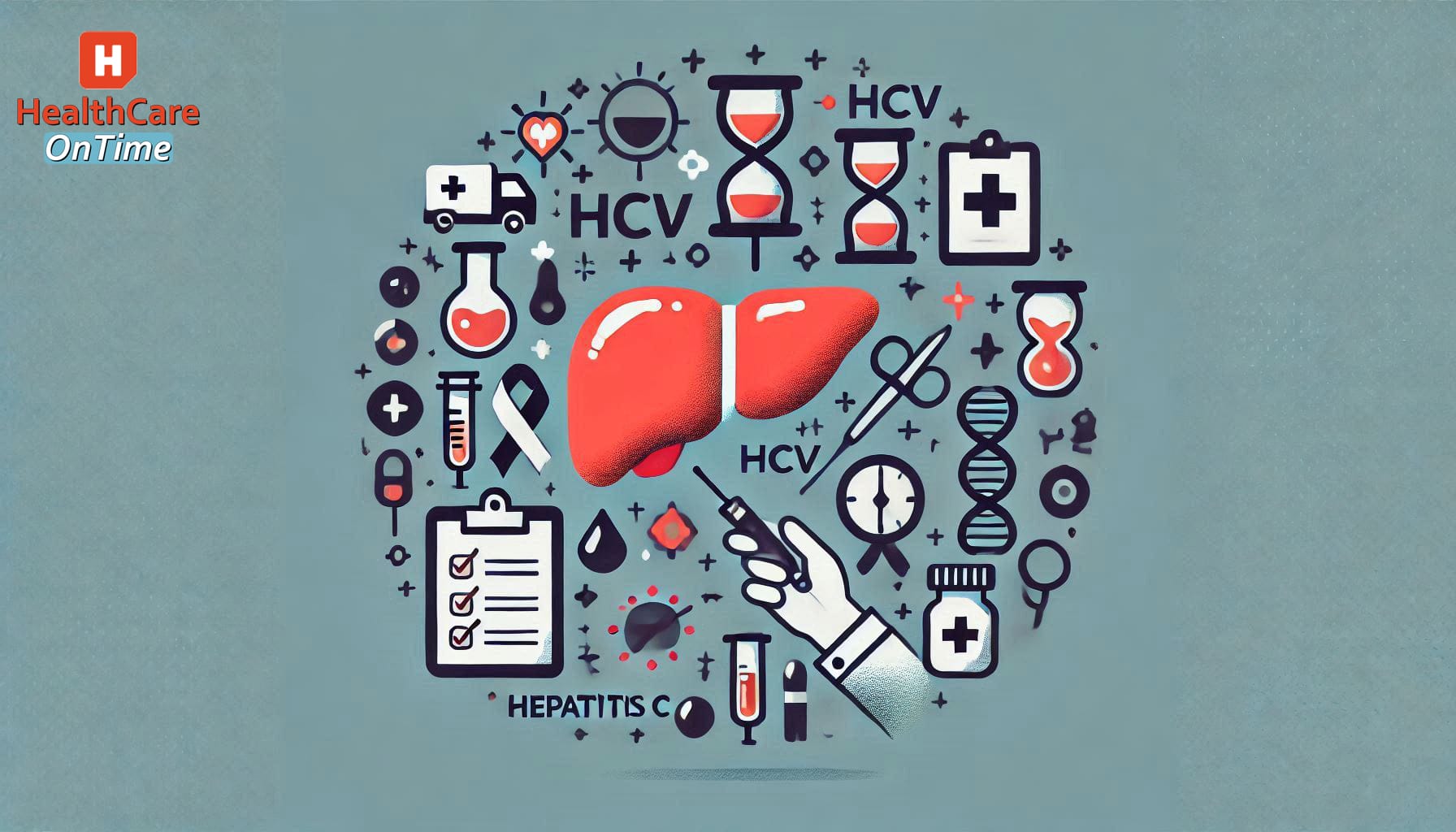
What Happens if You Are Diagnosed with Hepatitis C?
Medical Evaluation Process
When you are diagnosed with Hepatitis C, the first step involves a comprehensive medical evaluation to assess the extent of the infection and its impact on your liver. This process typically begins with a series of blood tests to confirm the presence of the virus and determine the viral load, which indicates the amount of virus in your bloodstream.
Your healthcare provider will also identify the genotype of the Hepatitis C virus, as this information is crucial for tailoring the treatment plan. Additionally, liver function tests are conducted to evaluate how well your liver is working and to detect any signs of liver damage. In some cases, imaging studies such as an ultrasound, MRI, or a liver biopsy might be performed to get a detailed view of the liver’s condition.
Treatment Initiation and Options
Once the medical evaluation is complete, the next step is to initiate treatment. “What happens if you are diagnosed with Hepatitis C?” is a critical question because it guides the subsequent actions and treatment decisions. Modern treatments for Hepatitis C are highly effective and primarily involve direct-acting antivirals (DAAs). These medications target specific steps in the viral replication process, thereby preventing the virus from multiplying. The treatment regimen usually lasts between 8 to 12 weeks, depending on the specific DAA used and the patient’s overall health condition.
During this period, it is crucial to adhere strictly to the prescribed medication schedule to achieve the best possible outcome. Your healthcare provider will explain the potential side effects of the treatment and how to manage them.
Monitoring and Follow-Up Care
Monitoring and follow-up care are essential components of managing Hepatitis C. “What happens if HCV is positive?” includes regular follow-up appointments with your healthcare provider to monitor your response to the treatment. These visits typically involve blood tests to check the viral load and ensure that the virus is being effectively eradicated from your body.
After completing the treatment, a final blood test is conducted 12 weeks later to confirm that the virus is no longer detectable in your bloodstream, indicating a sustained virologic response (SVR). Achieving SVR means that you are considered cured of Hepatitis C.
Long-term follow-up care may also be necessary to monitor liver health, especially if there was significant liver damage prior to treatment. Regular check-ups and liver function tests help ensure that your liver remains healthy and to detect any potential complications early.
What Are the Warning Signs of Hepatitis?
General Warning Signs Across Different Hepatitis Types
Hepatitis is a liver infection that can be caused by several types of viruses, including Hepatitis A, B, C, D, and E. Although each type of hepatitis has its unique characteristics, there are some general warning signs of hepatitis that are common across all forms. These include fatigue, jaundice (yellowing of the skin and eyes), dark urine, pale-colored stools, and abdominal discomfort, particularly in the upper right side where the liver is located.
In some cases, individuals may also experience nausea, vomiting, loss of appetite, and muscle or joint pain. These general symptoms can be signs of liver inflammation and should prompt individuals to seek medical advice for proper diagnosis and treatment.
Specific Signs for Hepatitis C
When it comes to Hepatitis C, the warning signs can be more subtle, especially in the early stages. Many people with Hepatitis C may not experience noticeable symptoms for years, even though the virus is damaging the liver. However, as the disease progresses, some “HCV Positive Symptoms” may begin to appear. These include fatigue, jaundice, unexplained weight loss, dark urine, and abdominal pain, particularly in the upper right side.
It is also common to experience swelling in the legs or abdomen (ascites), as well as confusion or trouble concentrating, which are signs that the liver is severely damaged. Because these symptoms are often mild and can be mistaken for other health issues, it is important to undergo regular testing if you are at risk of Hepatitis C.
Importance of Early Detection
Recognizing “What are the warning signs of hepatitis?” is crucial for early diagnosis and treatment. Early detection of Hepatitis C is particularly important because it helps prevent the progression to more severe liver damage, such as cirrhosis or liver cancer.
Many people with Hepatitis C do not show any obvious symptoms until the disease has advanced, making routine screening essential for high-risk individuals. The question “Is HCV a serious disease?” is an important one because if left untreated, Hepatitis C can lead to serious liver complications.
Catching the infection early allows for the initiation of effective antiviral treatments that can cure the disease and prevent further liver damage.
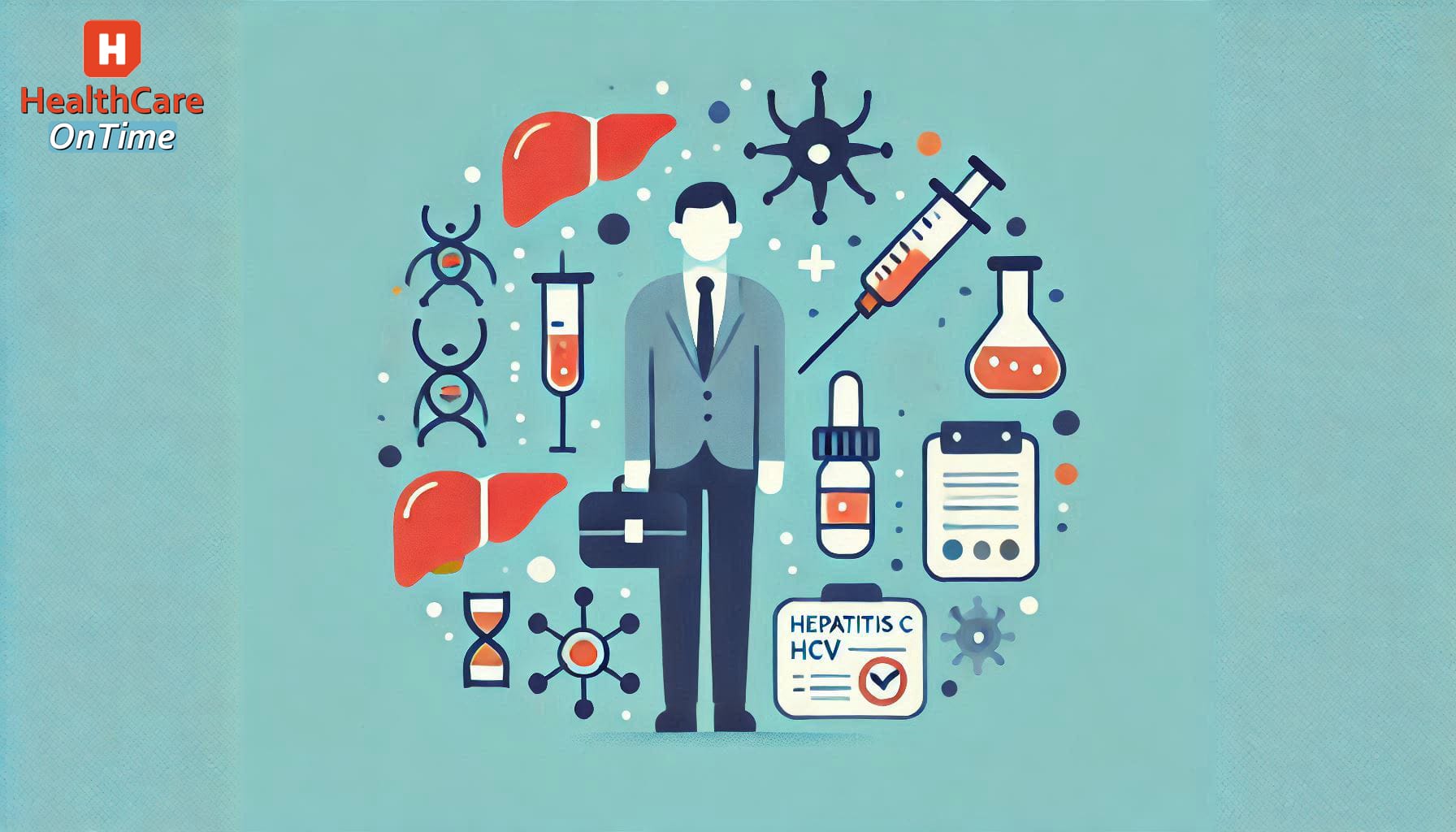
Is HCV a Serious Disease?
Potential Complications of Untreated HCV
Hepatitis C Virus (HCV) is a serious infection that, if left untreated, can lead to a number of severe complications. When the question “Is HCV a serious disease?” is asked, the answer is clear—untreated HCV can cause long-term damage to the liver and increase the risk of life-threatening conditions. Chronic HCV can lead to cirrhosis, which is the scarring of the liver tissue.
As the liver becomes more damaged, it loses its ability to function properly, which can result in liver failure. Another serious complication of untreated HCV is liver cancer, which can develop as a result of cirrhosis. These complications can significantly impact a person’s quality of life and may require liver transplantation if liver failure occurs.
In addition to liver damage, untreated HCV can also lead to extrahepatic complications, affecting other organs and systems in the body. These can include kidney disease, diabetes, and various forms of blood disorders. The sooner HCV is diagnosed and treated, the lower the risk of these potentially life-threatening complications.
Long-Term Health Implications
The long-term health implications of untreated Hepatitis C are significant. Chronic infection can persist for decades without noticeable symptoms, which is why many individuals with “HCV Positive Symptoms” may not seek medical care until the disease has already caused irreversible damage to the liver. Over time, the constant inflammation in the liver can lead to progressive fibrosis (scarring of liver tissue), which may eventually result in cirrhosis. Cirrhosis not only impairs liver function but also increases the risk of liver cancer. The condition can also cause other systemic effects such as jaundice, severe fatigue, abdominal pain, and swelling.
When asking, “Is HCV a serious disease?” it is important to consider the fact that untreated HCV can ultimately lead to chronic health issues that require ongoing medical care. These long-term consequences underscore the importance of early detection and treatment. If treated early, HCV can be managed, and many patients can live a healthy life free from complications.
Comparison with Other Hepatitis Types
HCV is one of several types of hepatitis, and while all forms of hepatitis can lead to liver damage, the severity and outcomes vary across the different types. Hepatitis A and E are usually acute infections, meaning that they can be cleared from the body without long-term damage. Hepatitis B, like Hepatitis C, can become chronic, leading to long-term liver issues.
However, unlike Hepatitis C, Hepatitis B has a vaccine available for prevention, which is not the case for Hepatitis C. Chronic Hepatitis B can also cause liver failure and liver cancer, but it generally responds to antiviral treatments better than Hepatitis C.
Hepatitis C, however, can be more insidious, as many people are unaware they are infected until significant liver damage has occurred. With the question, “What happens if HCV is positive?” being answered by early diagnosis, we can see that modern treatments for Hepatitis C have dramatically improved outcomes.
The question “Can HCV be cured completely?” can be answered affirmatively with the new treatments available, which are not only effective but also have minimal side effects compared to earlier therapies.

Can You Live a Normal Life with Hepatitis C?
Living with HCV: Lifestyle and Management
When diagnosed with Hepatitis C, many people wonder, “Can you live a normal life with Hepatitis C?” The good news is that with proper care and treatment, most individuals with Hepatitis C can lead a healthy and productive life. Living with HCV requires a combination of medical treatment, lifestyle changes, and regular monitoring to manage the condition effectively.
The first step is to seek medical care, as antiviral treatments can help clear the virus from the body and prevent liver damage. Many people who start treatment early can achieve a sustained virologic response (SVR), which means the virus is undetectable in the blood.
In addition to medical treatment, lifestyle management plays a critical role in maintaining health. It is important for individuals with Hepatitis C to avoid alcohol, as it can exacerbate liver damage. Eating a balanced diet rich in fruits, vegetables, whole grains, and lean proteins can help support liver function and overall health.
Regular physical activity, such as walking or swimming, can also improve overall well-being and reduce fatigue, a common symptom of “HCV Positive Symptoms.” Managing stress, getting enough sleep, and avoiding unnecessary medications that may strain the liver are also essential for people living with Hepatitis C.
Success Stories and Case Studies
Many individuals diagnosed with Hepatitis C have gone on to live fulfilling, normal lives after starting treatment. Success stories from people who have undergone antiviral treatment highlight the effectiveness of current therapies. For example, one case study involved a patient who had been living with Hepatitis C for over a decade but showed no severe “HCV Positive Symptoms” initially.
After beginning a course of direct-acting antivirals (DAAs), the patient achieved an undetectable viral load within a few months and has remained healthy ever since. These success stories demonstrate that “Can you live a normal life with Hepatitis C?” is not just a possibility—it’s a reality for many individuals.
It’s important to note that, while Hepatitis C is “Is HCV a serious disease?” in some cases, when caught early and managed appropriately, the disease can often be controlled without major impact on one’s daily life. This is why regular testing, early detection, and adherence to treatment regimens are critical for maintaining a high quality of life.
Tips for Maintaining a Healthy Life
For individuals living with Hepatitis C, maintaining a healthy lifestyle is crucial for managing the disease. Some important tips for healthy living include:
- Regular Medical Check-ups: Stay in touch with your healthcare provider to monitor liver health and viral load regularly. Early detection of any issues can prevent complications.
- Avoid Alcohol: Alcohol can increase the risk of liver damage. It’s essential to refrain from drinking to protect liver function.
- Exercise Regularly: Engage in moderate exercise to improve energy levels, reduce stress, and maintain overall health.
- Healthy Diet: Focus on a diet that supports liver health—rich in vitamins, antioxidants, and low in processed foods or unhealthy fats.
- Get Adequate Rest: Ensuring enough sleep is crucial to combat fatigue, a common symptom of Hepatitis C.
- Take Prescribed Medications: Follow your doctor’s instructions for any prescribed antiviral medications and other treatments.
By following these steps, many people with Hepatitis C can live a normal life and continue to engage in the activities they enjoy. Early intervention and lifestyle changes play key roles in ensuring that Hepatitis C does not define your quality of life.
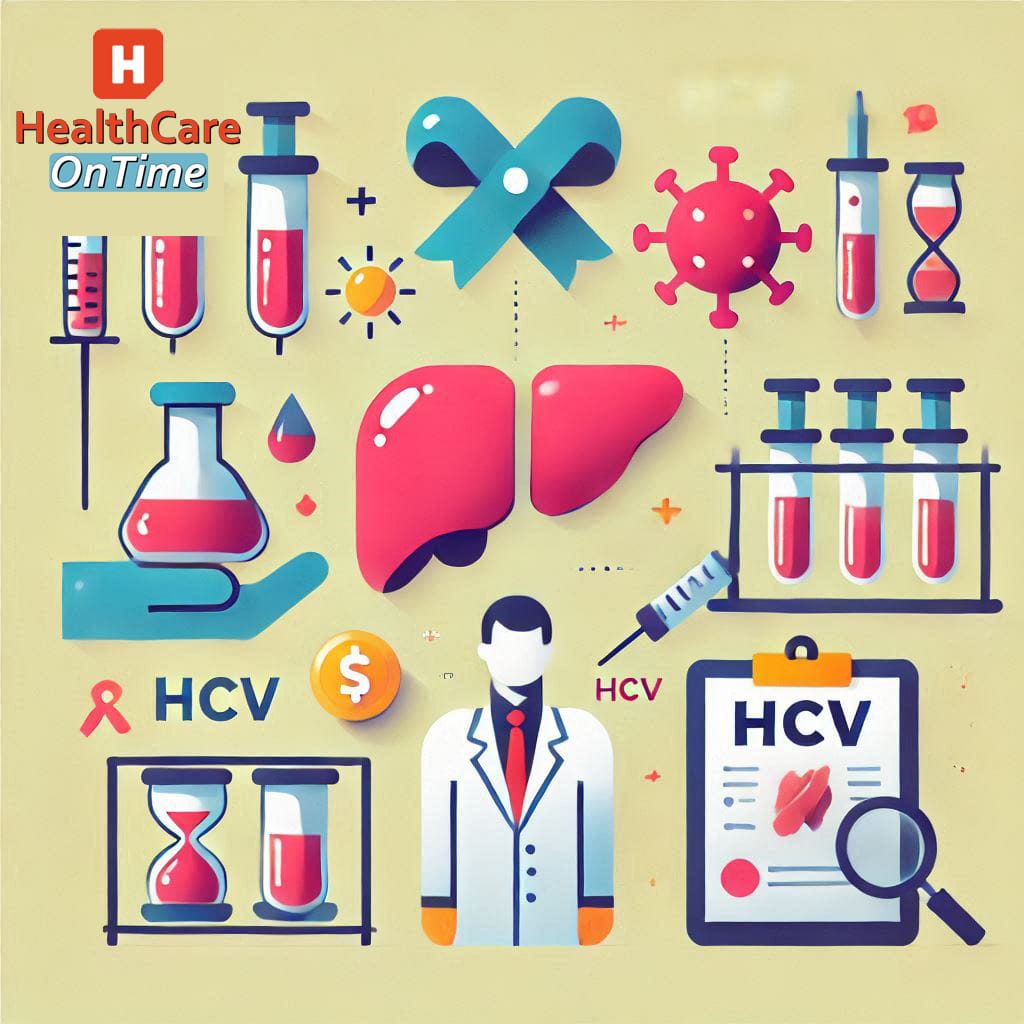
What is the Normal Range for HCV Test?
Explanation of HCV Antibody and RNA Tests
When it comes to diagnosing Hepatitis C, one of the most important questions people ask is, “What is the normal range for HCV test?” There are two primary types of tests used to diagnose and monitor Hepatitis C: the HCV antibody test and the HCV RNA test.
The HCV antibody test detects antibodies in the blood, which are produced by the immune system in response to the Hepatitis C virus (HCV). A positive result means that a person has been exposed to the virus at some point. However, a positive result doesn’t necessarily mean that the person still has the virus. It simply indicates past exposure. This is why further testing, specifically the HCV RNA test, is needed to confirm whether the person is currently infected with the virus.
The HCV RNA test detects the genetic material (RNA) of the virus in the blood. This test is more definitive because it confirms if the virus is actively replicating in the body. The test results will provide information about the viral load, or how much virus is present, which helps doctors determine the severity of the infection and decide on the best course of treatment.
Normal vs. Abnormal Results
When asking, “What is the normal range for HCV test?” it’s important to understand the difference between normal and abnormal results. For the HCV antibody test, a negative result means that no antibodies to the virus were detected, indicating that the person has never been exposed to Hepatitis C. On the other hand, a positive result suggests that the person has been exposed to the virus at some point, but it doesn’t necessarily mean they are currently infected.
For the HCV RNA test, a negative result means that no viral RNA was detected in the blood, which usually indicates that the person does not have an active Hepatitis C infection. An abnormal or positive result, meaning that viral RNA is present, indicates an active infection. The amount of virus (viral load) can be measured and tracked over time. A higher viral load may suggest a more severe infection.
Understanding Test Results and Their Implications
Understanding your HCV test results is crucial for proper diagnosis and treatment. A positive antibody test followed by a positive RNA test indicates active infection. If the results are positive for HCV, it’s essential to determine the severity of the infection and the stage of liver damage through additional tests, such as liver function tests, ultrasound, or liver biopsy. The question, “Is HCV a serious disease?” comes into play here because untreated Hepatitis C can lead to complications like liver cirrhosis or even liver cancer, especially if the infection has been ongoing for many years without treatment.
If you have “HCV Positive Symptoms,” such as fatigue, jaundice, or abdominal pain, it is even more important to follow up with your doctor to understand the test results and begin appropriate treatment. Depending on the results of the RNA test and the amount of liver damage, antiviral treatments can help control the infection, potentially leading to a cure.
For people with chronic Hepatitis C, understanding the normal range for HCV test results is key to managing the disease effectively. Regular monitoring through HCV RNA testing and other liver function tests ensures that the infection is being properly managed and helps prevent complications down the line.
Which Hepatitis is Not Curable?
Overview of Different Hepatitis Types
Hepatitis refers to inflammation of the liver, often caused by a viral infection. There are several types of hepatitis viruses, the most common being Hepatitis A, Hepatitis B, Hepatitis C, Hepatitis D, and Hepatitis E. Each type of hepatitis has different modes of transmission, symptoms, and treatment options. When people ask, “Which hepatitis is not curable?” they are often referring to Hepatitis B and C. However, the answer depends on the specific virus and the advancements in medical treatment.
- Hepatitis A: Hepatitis A is typically caused by consuming contaminated food or water. Fortunately, Hepatitis A is usually self-limiting, meaning that the body can often clear the virus without the need for specific antiviral treatment. A vaccine is available to prevent it.
- Hepatitis B: Hepatitis B is a more serious viral infection that can be either acute or chronic. Although there is no cure for chronic Hepatitis B, antiviral medications can help manage the infection and reduce the risk of severe complications such as cirrhosis and liver cancer.
- Hepatitis C: Hepatitis C is a viral infection that primarily affects the liver. Unlike Hepatitis B, there are now highly effective antiviral treatments that can cure most cases of Hepatitis C. It is important to note that while Hepatitis C can be cured, chronic infection can lead to severe liver damage if left untreated.
When asking, “Which hepatitis is not curable?” many people focus on Hepatitis B because, despite advances in treatment, there is currently no cure for chronic Hepatitis B. While the infection can be managed with antiviral medications, the virus can persist in the body, requiring lifelong monitoring.

Curable vs. Manageable Hepatitis
Understanding the difference between curable and manageable hepatitis is crucial for people living with any type of hepatitis.
- Curable Hepatitis: Hepatitis C is now considered a curable infection. Thanks to modern antiviral therapies, most people with chronic Hepatitis C can achieve a sustained virologic response (SVR), meaning that the virus is no longer detectable in their blood after treatment. This is a significant breakthrough in the treatment of Hepatitis C and has given hope to many who were previously facing the long-term consequences of the disease. Early detection and treatment are key to achieving a cure.
- Manageable Hepatitis: On the other hand, Hepatitis B is a viral infection that, while not curable, can be effectively managed with antiviral treatments. For individuals living with HCV Positive Symptoms or Hepatitis B, antiviral medications can help suppress the virus, preventing liver damage and reducing the risk of complications. However, since the virus remains in the body, long-term treatment and monitoring are necessary. For those with chronic Hepatitis B, the question, “Is HCV a serious disease?” is often relevant, as both Hepatitis B and C can lead to serious complications if not managed properly.
Focus on Hepatitis B and Its Management
Hepatitis B is one of the most significant liver infections worldwide. While the infection is manageable with antiviral medications, such as nucleos(t)ide analogs, Hepatitis B is not curable at present. These medications help control the virus, but they do not eradicate it completely from the body. Regular medical monitoring is required to assess liver function, detect potential complications, and adjust treatment as necessary.
Even though Hepatitis B cannot be cured, it can be controlled effectively in many cases. For individuals diagnosed with Hepatitis B, the goal is to minimize liver damage and reduce the risk of developing serious conditions like cirrhosis or liver cancer. If HCV Positive Symptoms are present in someone with Hepatitis B, additional testing may be required to determine the cause of the symptoms and whether there is co-infection with Hepatitis C.
While there is no cure for Hepatitis B, the availability of effective treatments means that many people with the virus can lead relatively normal lives, especially if they adhere to their treatment plan and make lifestyle adjustments.
Throughout this article, we’ve discussed various aspects of Hepatitis C (HCV), from understanding HCV Positive Symptoms to the importance of knowing What happens if HCV is positive? It’s important to recognize that while HCV Positive Symptoms can sometimes be mild or absent, early detection and treatment are critical for managing the disease.
What happens if you are diagnosed with Hepatitis C? is a question that many face, and understanding the steps to take after a diagnosis, including testing and treatment, is essential to maintaining good health.
We’ve also explored whether Can HCV be cured completely? The answer is that Hepatitis C can be cured with the right treatment, especially when detected early. However, it’s important to understand the seriousness of the disease, as Is HCV a serious disease? The virus can cause significant liver damage if left untreated, leading to severe complications.
That’s why it’s important to know What are the warning signs of hepatitis? so that you can act quickly if necessary.
We also discussed the tests used to detect Hepatitis C, such as the HCV antibody test and HCV RNA test. Knowing What is the normal range for HCV test? is essential for understanding your health status and making informed decisions about your care.
Encouragement for Early Testing and Treatment
The key takeaway here is the importance of early testing and treatment. If you experience HCV Positive Symptoms or have any risk factors for Hepatitis C, it’s essential to get tested as soon as possible.
What happens if you are diagnosed with Hepatitis C? The sooner you know your status, the better the outcome, as early treatment can prevent long-term liver damage. In some cases, What happens if HCV is positive? can lead to a cure, especially if caught early, thanks to advances in antiviral treatments.
For those wondering, Can you live a normal life with Hepatitis C? the answer is yes, with the right treatment and lifestyle changes. Many people living with Hepatitis C lead fulfilling, healthy lives, especially when they manage the condition proactively.
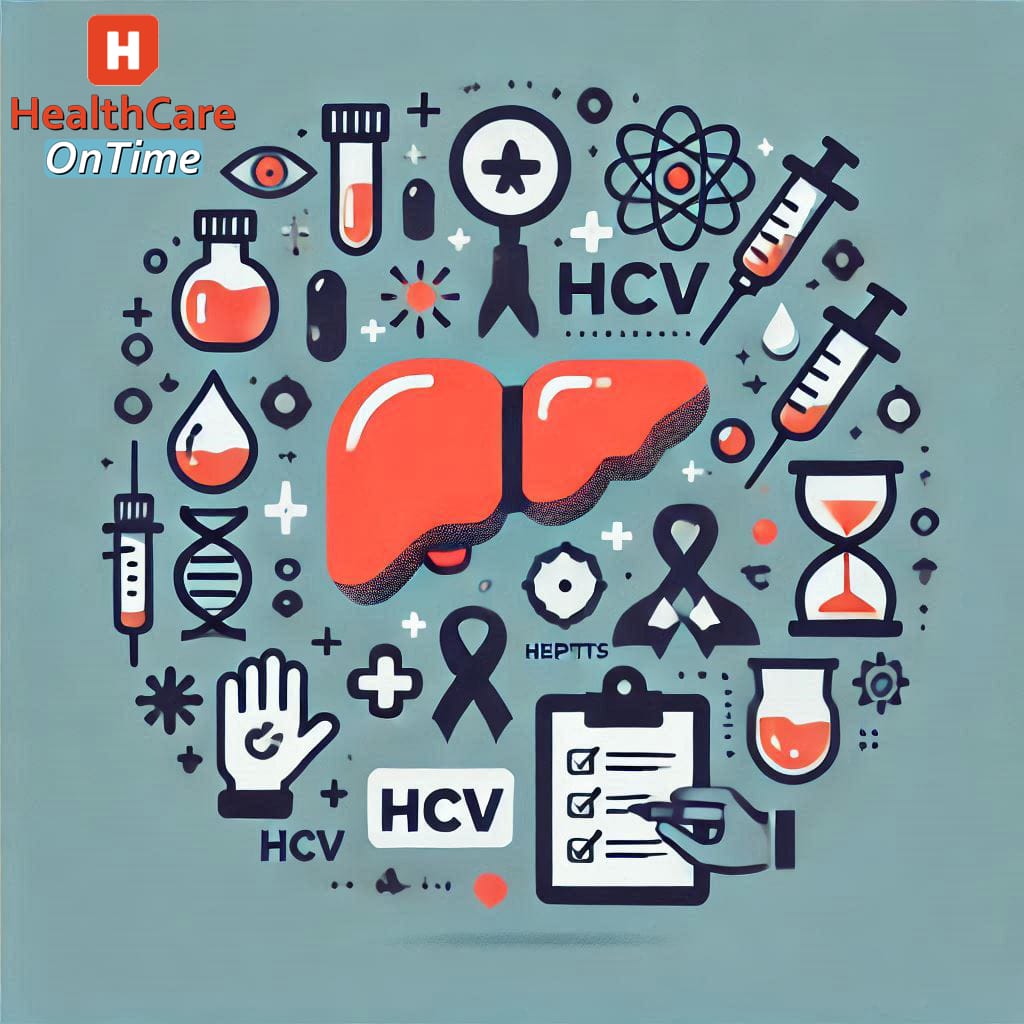
Final Thoughts on Living with HCV
While HCV Positive Symptoms can be challenging, with proper care and treatment, you can manage Hepatitis C effectively. It’s important to remember that although What is the normal range for HCV test? is a key part of understanding your health, it’s not just about the test results— it’s about taking action to prevent complications.
What are the warning signs of hepatitis? Knowing them can help you stay ahead of the disease. If you are diagnosed with Hepatitis C, make sure you follow up with your healthcare provider and understand What happens if you are diagnosed with Hepatitis C? and the next steps for managing the virus.
In conclusion, Which hepatitis is not curable? Hepatitis B is currently not curable, but it can be managed effectively. However, Can HCV be cured completely? the answer for Hepatitis C is yes, and early intervention is the key to success.
If you are wondering, Is HCV a serious disease? it can be, but with the right treatment, you can live a normal, healthy life. Can you live a normal life with Hepatitis C? Absolutely, with proper care, lifestyle adjustments, and regular monitoring.

